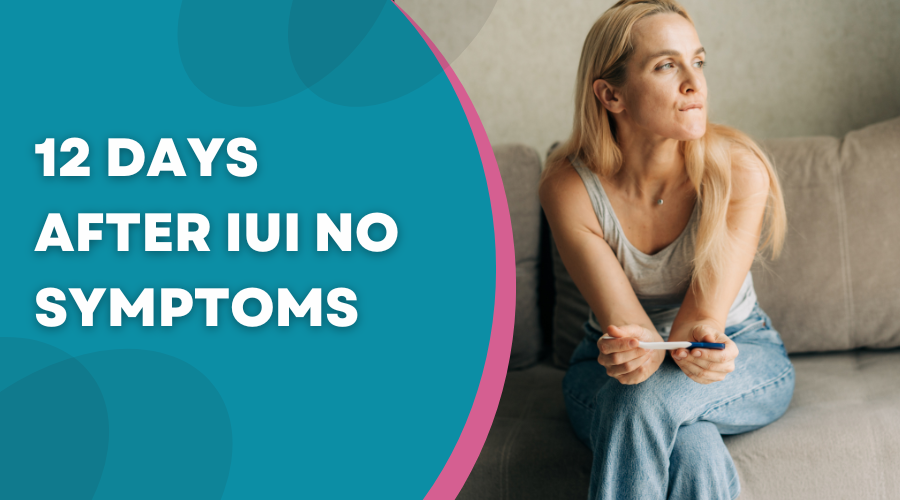The birth of a child is often a life-changing moment filled with love and joy. Yet, for many, this dream comes with challenges. In India, infertility affects around 10-15% of couples of reproductive age, with both men and women equally likely to face underlying issues.
Dr. Nisarg Patel, a qualified fertility specialist at Nisha IVF Centre, explains:
“Conditions like polycystic ovary syndrome (PCOS), endometriosis, or unexplained infertility often pose barriers to natural conception. Intrauterine Insemination (IUI) is a minimally invasive and cost-effective option that has helped countless people achieve their dream of parenthood.”
While IUI can bring optimism, it’s also accompanied by emotional highs and lows, especially when waiting for results. For women undergoing IUI, the lack of any symptoms 12 days after the procedure can lead to anxiety.
Is it a sign of failure? Or could it still mean success? This blog explores these questions, addressing potential causes, normalcy, and the steps you can take to navigate this uncertain time.
Feeling unsure about what to expect after IUI? Let’s uncover when symptoms might start appearing and what they could mean.
When and What Symptoms Can I Expect After IUI?
Signs of pregnancy after IUI often start to appear between 10 to 14 days, though this timeline can differ significantly from person to person. Each individual’s body responds uniquely to the process, influenced by factors like hormonal shifts and overall health.
Some of the most common symptoms include:
Mild Cramping: Often felt a few days after IUI due to the catheter procedure or as a result of early uterine changes.

Spotting: Light bleeding or spotting can occur either as a side effect of the IUI procedure or due to implantation, which typically happens 6-12 days post-ovulation.
Breast Tenderness: Hormonal changes, particularly an increase in progesterone levels, can cause sensitivity in the breasts.
Fatigue: The body’s preparation for pregnancy can cause significant energy depletion, leading to a persistent feeling of tiredness.
Bloating: Increased progesterone levels can lead to water retention and bloating, a common early symptom of pregnancy.
Mood Swings: Hormonal fluctuations during this period can lead to emotional ups and downs. These mood changes might be more noticeable for some, while others may experience them subtly.
Dr. Nisarg Patel, a skilled fertility specialist at Nisha IVF Centre, adds:
“Some individuals may experience heightened sensitivity to smell, mild nausea, or changes in appetite. These are less common but still fall within the range of early signs that can appear post-IUI. Remember, experiencing or not experiencing these symptoms does not definitively confirm pregnancy. Each individual’s body reacts differently.”
12 Days After IUI, No Symptoms – Is It Normal?
Yes, it is entirely normal to have no symptoms 12 days post IUI. Symptoms can vary significantly among individuals, with some women showing early signs of pregnancy while others feel completely normal until a missed period. The absence of symptoms doesn’t indicate a failed cycle.
Dr. Nisarg Patel, an eminent fertility doctor in Ahmedabad, notes:
“Factors like hormone levels, body sensitivity, and the implantation timeline contribute to these differences. Some symptoms might also be so subtle that they go unnoticed. Importantly, not all pregnancies present with the same signs. “
Feeling uncertain about your IUI journey? Consult a reliable medical professional today to understand your next steps and gain peace of mind.
Curious about why some women have no symptoms after IUI? Let’s delve into the possible causes.
Causes of No Symptoms 12 Days After IUI
Delayed Implantation:
Sometimes, the fertilized egg takes longer to implant in the uterus, delaying the onset of symptoms. Implantation timing can vary by a few days, depending on the individual’s cycle and overall health.
Subtle Hormonal Changes:
Not all hormonal shifts after IUI are noticeable, which can lead to a lack of symptoms. Hormone levels may fluctuate below the threshold required to produce noticeable physical changes.

Progesterone Support:
Medications like progesterone supplements can mask or delay typical early pregnancy signs. These supplements may also mimic early pregnancy symptoms, making it harder to differentiate between medication effects and actual pregnancy signs.
Body’s Response:
Every person’s body reacts uniquely to hormonal changes, making some signs less apparent. Factors like metabolic rate, lifestyle, and pre-existing health conditions can influence how symptoms manifest.
Dr. Nisarg Patel, an experienced ivf doctor at Nisha IVF Centre, advises:
“It’s important to understand that the absence of symptoms is not necessarily negative. Each journey is unique, and factors like stress, overall health, and timing play crucial roles. If you’re feeling anxious, it’s best to seek professional advice to address your concerns.”
Let’s explore what steps you can take to stay proactive and informed.
What Should I Do If I Notice No Symptoms 12 Days After IUI?

Stay Positive:
Lack of symptoms doesn’t mean the IUI cycle hasn’t worked. Focus on staying calm and optimistic. Stress can negatively impact your body’s response to treatment, so practicing mindfulness or relaxation techniques can be beneficial.
Track Your Cycle:
Keep a detailed record of your menstrual cycle and any subtle changes you might notice. Monitoring your symptoms or lack thereof can provide valuable information for your healthcare provider.
Take a Pregnancy Test:
If your period is delayed, a home pregnancy test can provide initial insights. Follow the instructions carefully for accurate results, and confirm with a blood test for a definitive answer.
Stay Nourished:
A balanced diet and adequate hydration can help your body adapt to any changes. Including nutrient-rich foods like leafy greens, lean proteins, and whole grains can further promote a healthy hormonal balance.
IVF specialists at Nisha IVF Centre add:
“Always adhere to prescribed medications and lifestyle recommendations. These measures support your body during this crucial time and enhance the chances of success. Consulting your doctor regularly also ensures any concerns are addressed promptly.”
Worried about the absence of symptoms after IUI? Speak to an experienced medical professional for tailored guidance and reassurance.
Here’s what you need to keep in mind as you move forward.
Conclusion – Embracing Your Unique Journey
Advancements in fertility treatments have empowered countless individuals to achieve their dream of parenthood. The absence of symptoms 12 days after IUI is a normal part of the process for many and doesn’t diminish your chances of success.
Dr. Nisarg Patel, a compassionate fertility specialist in Ahmedabad, concludes:
“Every IUI journey is unique. What truly matters is staying patient, informed, and optimistic. Remember, this phase is only one chapter of your path to parenthood. With the right support, the outcome can be truly rewarding.”
It’s time to address some common concerns surrounding IUI.
FAQs
Can stress impact IUI outcomes?
Yes, high stress levels can influence hormonal balance and potentially affect implantation. Finding ways to manage stress, such as relaxation techniques or counseling, can be beneficial.
Is cramping normal after IUI?
Mild cramping is common due to the procedure or early hormonal changes. However, you must get evaluated by a doctor if the pain is severe or persistent.
How soon can I take a pregnancy test after IUI?
It’s recommended to wait at least 14 days post-IUI to ensure accurate results. Testing too early might lead to false negatives.
Can lifestyle affect IUI success?
Yes, maintaining a healthy lifestyle, including a balanced diet, regular exercise, and avoiding harmful habits like smoking, can positively impact success rates.
Are follow-up visits necessary after IUI?
Yes, follow-up appointments help monitor your progress, address concerns, and provide timely advice based on your unique situation.
Disclaimer: The information shared in this content is for educational purposes only and not for promotional use.
Reference links:
https://www.scrcivf.com/implantation-after-iui-symptoms-to-look-for-and-what-to-expect/
https://www.mayoclinic.org/tests-procedures/intrauterine-insemination/about/pac-20384722


